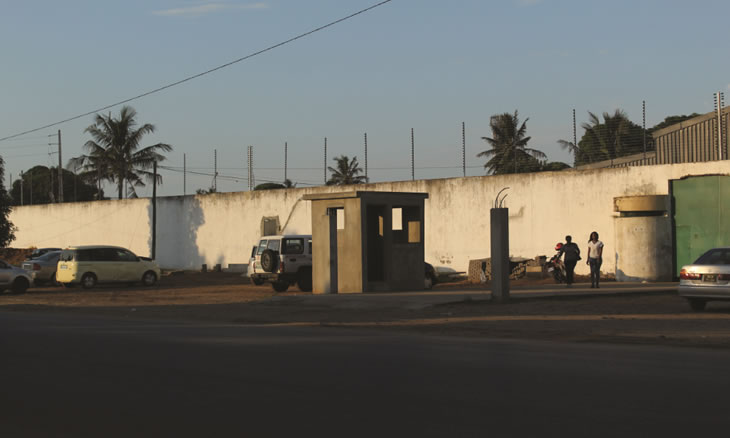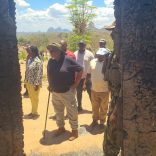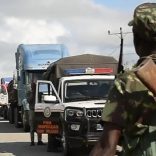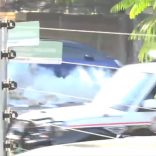Mozambique: Victims of terrorist raid call for urgent food aid - AIM
Satar admits using false passport – AIM report

Photo: O País
Mozambique’s most notorious assassin, Momad Assife Abdul Satar (“Nini”), on Tuesday admitted that he had used a false passport to leave the country in 2015, but claimed he had no option because his life was in danger.
Satar is one of the three businessmen convicted of hiring the death squad that assassinated the country’s foremost investigative journalist, Carlos Cardoso, in November 2000. He was given a 24 year prison sentence, but a Maputo judge, Aderito Malhope, released him on parole in 2014, after serving just half his sentence.
He claimed he needed medical treatment that is not available in Mozambique, and so intended to visit India. In fact, from his false passport, it could be seen that Satar had visited several Asian countries (including Saudi Arabia, Cambodia and Singapore), but these did not include India.
The Attorney-General’s Office (PGR) continued to investigate Satar’s involvement in other crimes, notably the kidnappings of business people which shook Mozambican cities as from mid-2011. The Maputo City Court revoked his parole in April 2017 and, with the help of Interpol, he was tracked down to Thailand in July 2018.
For the false passport, Satar used the name of his nephew, Sahim Mohammad Asslam, and the passport was issued by a unit of the migration service (SENAMI), that dealt with biometric passports, headed by Cidalia dos Santos, an official now under investigation for issuing dozens of Mozambican passports to foreign citizens, particularly Nigerians.
Asslam and dos Santos were both in the dock beside Satar during Tuesday’s proceedings, held at the Maputo top security prison.
Under interrogation, Satar claimed that the passport was not false, but contained a genuine photograph albeit of someone with a different name. No immigration service in the world would take such claims seriously.
According to the account of the trial in Wednesday’s issue of the independent newssheet “Mediafax”, Satar claimed that neither Asslam nor dos Santos had anything to do with the passport. He said he did not know dos Santos, and that his nephew had been unaware of the existence of the passport until his arrest in Bangkok.
He said the passport has been facilitated “by a high ranking official in SENAMI”, whose name he did not know. He could not remember this person’s telephone number, and was not sure he could identify the official if they met again.
Satar said he had attempted to obtain a legal passport, in his own name, but his requests were not granted and he did not know why. He alleged that by refusing to issue the passport, SENAMI was disobeying an instruction from judge Aderito Malhope of the City Court.
In December 2014, Satar continued, he received a phone call from the mysterious “high ranking SENAMI official”, who said he wanted to help, because he knew a plan was afoot to assassinate Satar, in January 2015, and this was why his passport requests had been denied.
The plotters supposedly wanted to keep Satar in Maputo until January, and then he would be murdered – just as the other two businessmen found guilty or ordering Cardoso’s assassination, his brother Ayob Abdul Satar, and bank manager Vicente Ramaya, had been murdered.
The “high ranking official” said he wanted to help because he had been a great friend of Ayob Satar, and could not let the same fate overtake the brother of his murdered friend. But leaving the country is no guarantee of safety – Ayob Satar was murdered, in July 2014, not in Maputo, but in the Pakistani city of Karachi.
The “high ranking official” met Satar near the beachside Radisson Bleu hotel in Maputo. Neither left their cars, and Satar used a 10 year old child as a go-between to deliver the passport photos to the official.
A few days later the “high ranking official” rang Satar again to say that the passport was ready and that he should leave the country, because the assassination plot was serious. The alleged plot plus the supposed need for medical treatment abroad “because of illnesses accumulated over thirteen years in jail”, convinced Satar that he must leave Mozambique.
He went to Namaacha, on the border with Swaziland (now Eswatini), and thanks to intervention from the “high ranking official”, he did not even have to leave the car before being whisked through customs control.
Satar admitted the crime of using a passport that was not his own, but said he had only done so because his life was at stake. He told the court “99 per cent of people would have acted as I did”.
Asked how much he had paid for the services of the “high ranking official”, Satar said that, because of his supposed friendship with Ayob, this good Samaritan charged nothing at all.
Asslam’s defence was much simpler – he told the court he had no idea his name had been used to acquire a passport for his uncle, and did now know how his identity card had been used to fake the passport.
As for Cidalia dos Santos, she too denied all knowledge of the false passport, although she was coordinator of a SENAMI group dealing with biometric passports, and her password gave her access to all the computers used to produce travel documents.
She suggested that somebody else had somehow obtained access to her password and used it to produce Satar’s passport.
The trial has been adjourned to 3 May, when witnesses from SENAMI will be called.











Leave a Reply
Be the First to Comment!
You must be logged in to post a comment.
You must be logged in to post a comment.